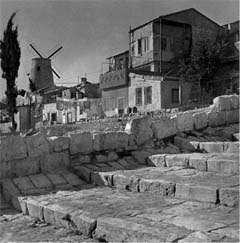 The
late Ottoman period may be said to begin with a bang, namely, with the
arrival of a French expeditionary corps in 1799 on the shores of Egypt,
led by general Napoleon Bonaparte. French occupation has no lasting impact
but it inaugurates the decline of the local Mamluks and the beginning of modern
European interference in the affairs of the Middle East.
The
late Ottoman period may be said to begin with a bang, namely, with the
arrival of a French expeditionary corps in 1799 on the shores of Egypt,
led by general Napoleon Bonaparte. French occupation has no lasting impact
but it inaugurates the decline of the local Mamluks and the beginning of modern
European interference in the affairs of the Middle East.
Over the course of the nineteenth century,the Great Powers (France, England,Russia, Austria-Hungary, Germany, Italy) do everything to position themselves in the race to inherit the Ottomans whose power had been steadily on the decline since the late 17th century. Jerusalem--with its significant non-Muslim minorities--provides a particular pretext for foreign representation. The influx of consuls, missionaries, and foreign advisors, eager to cast themselves as the protectors of Christian, Druze, and Jewish minorities, demonstrates that Jerusalem has once again become a token in a struggle for imperial dominance.
While the "Central Powers" (Germany, Austro-Hungary, and Italy) eventually align themselves with Turkey, other powers (Great Britain, Russia, France) inch toward a dismantling of an "ailing man at the Bosporus" internally troubled by corruption and growing unrest, covertly fomented by the Great Powers, among the often Christian educated Arabs of the Lebanon and Syria and among the Arab leadership of the Hidjaz (Mecca, Medinah).
The general European trend of national awakenings also sets the stage for Theodore Herzl's plan to persuade the Great Powers to sponsor the project of a Jewish state.
Jerusalem itself is so overcrowded and economically backward at this time that the founder of political Zionism had few complimentary things to say about the city, which he visited in 1898. (Click HERE to read what Herzl wrote about Jerusalem.)
Image:
Yemin Moshe
(First Jewish Quarter established outside the Old City Walls.)